Guide to storing medical equipment
Most medical practices like to keep all their equipment on-site. You never really know when you’re going to need an extra syringe urgently, the last bottle of Aspirin, that backup ultrasound, or whatever else you keep around as plan B. So it’s good to have it all handy when the need arises. But if you’re moving your practice or if you simply don’t have enough space to keep everything you own on-site, sometimes storing medical equipment is your only choice. Luckily, movers Boise area offer all kinds of storage space. You need to determine the best option for you before you rent a storage unit. Plan in advance, and list all the items you plan to store – that is a great start!
Before storing medical equipment, think about transport
One of the important things before you can actually plan where or how you will be storing medical equipment, you need to plan and organize transport for it. You can easily find commercial equipment movers that can assist you, so you can be sure that everything is handled properly. When it comes to sensitive and valuable items like medical equipment – you need to make sure that it is handled properly. Trained professionals know how to handle it without any issues, and they will make sure that everything is intact. Also, make sure that the drivers have enough experience with this type of transport. It is important to make sure that everyone involved in this process is experienced and trained for this type of transport.

Packing is also a key moment
A lot of companies focus on making sure that medical equipment is stored in a proper storage unit, but they disregard how important it is for it to be packed perfectly. In order to make sure that everything will be without any damage, you need to look for packing supplies Boise that is high-quality and highly recommended. Once you know that you got the best packing supplies, you need to make sure that everything is packed properly. It is important to make sure that all of your medical equipment won’t get damaged in transport and that it is properly secured.
You can try to pack everything by yourself, or you can hire professionals who know how to pack sensitive items like medical equipment. It is a good investment since your medical equipment will be safe from any possible issues. Also, professional packers will be helpful when it comes to loading everything into the trucks. They can talk with movers and advise them how to load everything to prevent any damage.
Find the right storage unit for storing medical equipment
There are three things you need to consider when you want to store medical equipment: where to store it, how to prepare it, and how to transport it. You can solve all three by hiring the right moving company. If they offer medical equipment shipping services, commercial packing, and storage space, you’re basically all setup. But you still need to pick the right storage unit. This is pretty much the most important decision whenever you’re storing things – the right storage unit will be easy to maintain and will keep your equipment in perfect condition.
You need to choose the right type of storage unit, but you also need it to be in the right size. Choosing a storage unit that is either too small or too big will cause you issues along the way, so you need to be smart about it. But with this simple guide, you will know what is the best option for you!
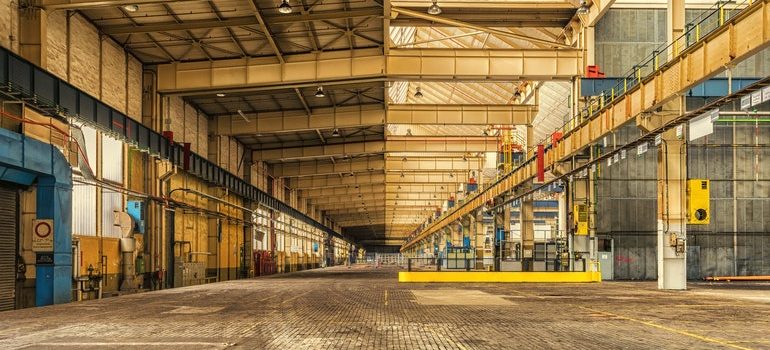
What are the types of storage units?
Before you choose the right storage unit for storing medical equipment, you need to know what are the main differences between different units. Since you need it to store very delicate medical equipment, you need to make sure that you choose the best option in the long run. The first type of storage unit is the regular type – there is no special air conditioning, you choose what size you need, and that is it. This storage unit is good when you are storing things for a short time, and you are storing items that are not temperature sensitive.
On the other hand, there are temperature-controlled storage units that most of the Boise moving and storage companies offer. The main benefit of this type of storage unit is that the temperature is always maintained at the same level. And when you are storing medical equipment that is sensitive, you need to make sure that it won’t be under big temperature fluctuations. You can choose the temperature, and no matter what is the weather outside – your medical equipment is safe!
Choose temperature-controlled space
Even if you don’t have valuable belongings, it is much safer to store items in a temperature-controlled space. However, certain sensitive items like antiques, valuables, and medical equipment among others, require temperature-controlled storage Boise. So your choice is easy: temperature-controlled storage is the way to go in this case. It will allow you to maintain optimal conditions for your equipment (whether it’s mechanical or chemical) and ensure that it’s stored properly. You won’t have to worry about a thing, and you will be following all the requirements for storing medical equipment.
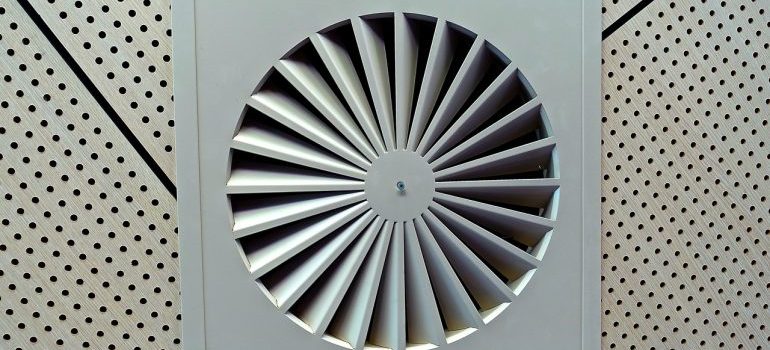
Pick the right size for your storage unit
One of the most important decisions when choosing a storage unit is how big you want the space to be. Storage comes in a variety of sizes, from what is approximately a closet to an equivalent of a large garage or even bigger. You should know that there is also industrial storage that a lot of businesses choose for their items. Especially if they plan to improve their business and they expect that they will be needing much more space.
Before you make a final decision about the size of your storage unit, you need to think in advance and plan what you will be storing. Simply a bigger unit will cost more and make it more difficult to maintain optimal conditions. Ideally, you want a unit that comfortably fits what you want to store without leaving too much empty space. However, if you’re not sure how big of a storage unit you need, going bigger is always the safer option. Also, if you plan to expand your business in the next couple of years, it is much wiser to choose a bigger space unit or even an industrial one. It will be much cheaper than moving everything around a year from now. Plan in advance!
Location matters
The location of the storage unit is something you should take into consideration when making your decisions. This will affect the unit’s price and your ease of access. When it comes to medical equipment storage, you want something you can access whenever you want. This makes it easier to both get things out of storage and regularly check that everything is in order. It is much wiser to pay extra but to make sure that you can access the storage unit with ease. There are different options, so make sure to ask the storage facility manager about their rules for accessing storage units.

Pay attention to the storage facility
One of the things that people often disregard is how the storage facility is maintained. But, since you are storing expensive and sensitive medical equipment you need to make sure that the storage facility is well-maintained and clean. You need to store medical equipment in a clean space, without any issues. Also, pay attention to storage security. Do they have guards, cameras, and additional locks? Feel free to ask all the questions you need, after all, you are storing expensive medical equipment, and it is only natural that you want the best storage unit.
Pay attention to safety when storing medical equipment
Medical equipment, as you know, is very expensive. A single machine can cost tens of thousands of dollars or more. On top of that, a lot of medical equipment has uses outside of medicine. And if you’re storing things like syringes, vials, and chemicals, you can probably imagine yourself exactly what other purposes those can serve. All this is to say that there is a black market for medical equipment out there. So there are also people who are willing to steal it. Luckily, commercial storage in ID does come with certain security measures. Investing in extra security is a good idea if you’re storing things that are very valuable. Consider measures such as:
- extra locks, keypads, or even biometric locks
- high-security units
- storage with on-site guards
- video surveillance
- limited access to the unit
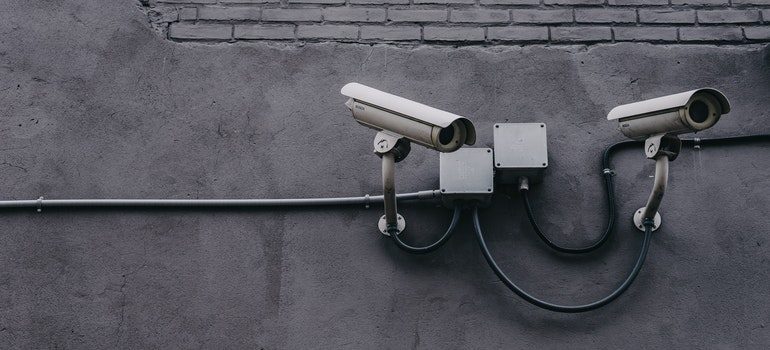
Organizing and storing medical equipment will take time
Once you’ve found the perfect unit of the right size and in the right location as well as ensure the safety of your equipment, it’s time to start sorting things out, packing them, and transporting them to storage. Here are a few things you want to keep in mind during this process. You will need to organize your storage and make sure that everything is stored properly. For some of the items, you will need moving boxes Boise, but for some, you will need plastic containers and clear bins. Organizing a storage unit with medical equipment will take time, but it will be worth it in the end. It is important to note if you plan to store some highly-valuable items it is much better to get a shelf that can be locked or even a safe.
You will need shelves
A general golden rule is that you really shouldn’t place anything on the floor. Besides hygiene and humidity, you are risking a potential mess that can cause a lot of problems with your medical equipment. You will need shelves so you can organize all the items you plan to store. They come in different sizes and shapes, so you will be able to fit them just right in without any issues.
You will need pallets
If you plan to store some big and bulky items, pallets are a much wiser choice than shelves. Pallets can be moved around mechanically, and you can be sure that your belongings will be much safer if you use them. Everything will be separated from the floor, and today you can even find block-stacked pallets or even pallet racks. So no matter how you plan to organize your storage unit with the medical equipment, you can be sure that you will have all the equipment you need to organize it properly.
Simplify your inventory when storing medical equipment
There’s probably no need to store absolutely everything you don’t have space for. If you have equipment that you don’t actually use often, machines you’ve already replaced and upgraded, or medication that will probably expire before you get to use it, you can give it away so it can go to a good cause. If you’re not going to use them, then isn’t it better to donate your medical supplies than to let them gather dust in storage somewhere? You’ll even have the added benefit of not needing as much storage space and not having to pack as many things!
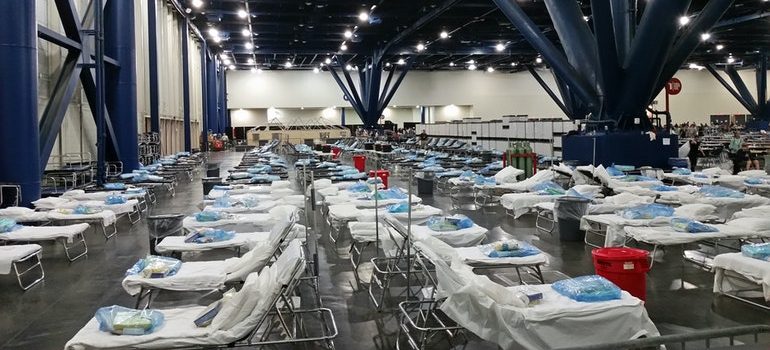
You will need a category system for storing medical equipment
One of the things that will help you to organize a storage unit is a category system. It will also help you to keep the unit organized all the time. If you are not sure how to do it – don’t worry. There are a lot of different options, so you can choose the one that is the best for you. Some people prefer to organize things alphabetically. That way, they know exactly where to look.
On the other hand, some people assign each item a number and categorize them numerically. If you choose the second option, you need to make sure that there is a guide in the storage. So you can find what you are looking for with ease.
Labeling is a must!
No matter how you categorize your medical equipment, you need to label everything. That way, you will find much easier what you are looking for. It is an additional task, but it will make everything much easier in the long run. Make sure that labels are clear, black and white, and large. You will avoid all the possible confusion, even if you forget your reading glasses.
Clear storage bins are the way to go
Using clear storage bins can make everything much easier. Even when they are labeled, you will be able to easily check if you can find what you are looking for. This will also make keeping track of your inventory much easier. make sure to choose high-quality bins. So even if something falls – it will still be intact. And a general rule for organizing a storage unit with medical equipment is that the items you will often use should go to the bottom shelves.
Hygiene is very important when storing medical equipment
When you are storing medical equipment, you need to make sure that the hygiene is on a higher level than in a regular storage unit. There can not be any dust, mold, rats, or insects. That is unacceptable for a storage unit with medical equipment. So you need to organize cleaning often. You can do it on your own with your team, or you can hire professional cleaning agencies that can keep your storage unit clean and tidy. If you are hiring someone, make sure to notify them about all the hazardous items that are in your storage unit. This is an important step in order to avoid any potential issues.
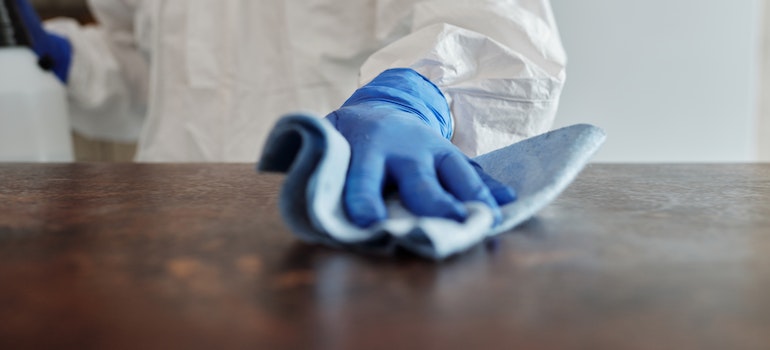
Keep your storage organized
No matter what you’re storing, it is very important to keep your storage unit in order. It makes your belongings easier to access and your unit easier to maintain. When you’re storing medical equipment, however, this is even more important. Because medical equipment is both fragile and valuable, you always need to know what’s in your unit and where so that you can easily locate it, check that it’s there, and make sure that it’s in good condition. With a category system, labeling, and clear bins you will be able to manage your storage unit with ease.

